Articles Menu
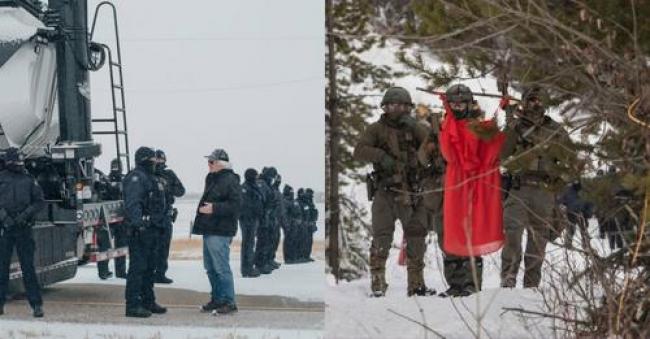
Feb. 4, 2022
Two years ago, a group of Indigenous protesters and supporters blockaded a CN rail line west of Edmonton, armed with wooden pallets and signs spray painted with “No pipelines.” They were there as part of nationwide protests to support Indigenous land defenders opposed to the Coastal GasLink pipeline — with barricades across Canada that ultimately resulted in the cancellation of hundreds of trains. Alberta Premier Jason Kenney dubbed the protests a “lawless mockery of our democratic principles.” The blockades were dismantled.
Now, First Nations leaders in Alberta say the response to protesters opposing vaccine mandates who have blockaded the U.S. border near the Alberta village of Coutts is proof of a racist double standard in the way protest is handled in the province, particularly in light of previous government responses to Indigenous blockades.
As the Coutts border blockade that started on Jan. 29 drags on, with goods and people stranded for days, the governing United Conservative Party faces allegations that it’s bending to the will of protesters upset over COVID restrictions and a new federal mandate on vaccinations for cross-border truckers.
Kenney and his party have moved up the timeline for easing the province’s vaccine passport laws and MLAs have been calling on their own government to lift the provincial mandates in order to appease the truckers manning the blockade. One MLA, Grant Hunter of the Cardston-Taber-Warner riding in southern Alberta, appeared at the border protest on Jan. 29.
It’s a far cry from the same government’s response to anti-pipeline blockades in 2020.
Back then, when Indigenous protesters blockaded rail lines in support of hereditary Wet’suwet’en chiefs opposed to the construction of the Coastal Gas Link pipeline through their territory, the response of the Alberta government was to swiftly introduce legislation with significant penalties for those who blocked what the government deemed critical infrastructure.
Bill 1, the Critical Infrastructure Defence Act, included everything from sidewalks to roadways in its sweeping definition of what could be listed as critical infrastructure, and brought with it fines of up to $25,000 and up to six months in jail.
When introducing the legislation, Kenney said his government would do “whatever it takes to ensure our economic future, including a future of natural resource development.” In the Legislature, MLA Michaela Frey lambasted protesters as “green zealots and eco-radical thugs,” while Infrastructure Minister Prasad Panda said they were “thugs who have appropriated the noble goal of reconciliation with Canada’s native peoples and used that as an excuse to hold the country hostage.”
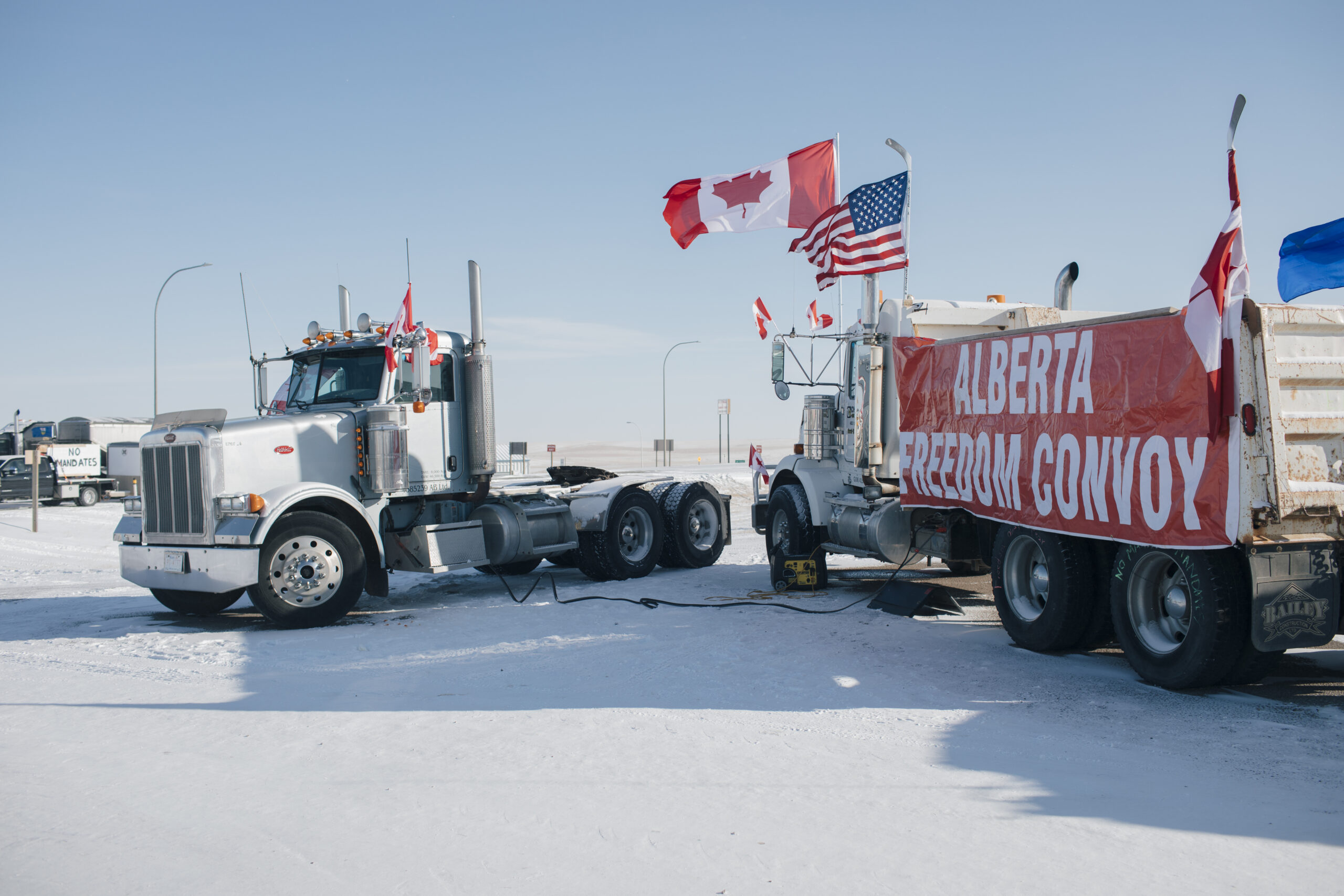
That rhetoric is also a long way from the premier’s statements on the recent demonstrations, even as he urged those blocking the border to end their illegal protest.
“I think the vast majority are well-intentioned, law-abiding Canadians who are sick and tired of how COVID has turned their lives upside down,” Kenney said on Tuesday at a news conference.
“So to those folks who’ve been out there trying to make that point, peacefully and respectfully, thank you, thank you for using your democratic rights to do that. Thank you for sharing your passion, your frustration. And I certainly hear you.”
On Wednesday, the Athabasca Chipewyan First Nation in northern Alberta issued a letter from its Chief and Council condemning the double standard it says is at play.
“If this blockade was being organized by Indigenous people, we have no doubt that authorities would respond quickly to remove the blockade and utilize the law that has been created to do so,” it reads.
“Yet in Coutts we see the inequities in our country when it comes to Indigenous people and the methods used to control our rights to peaceful protest.”
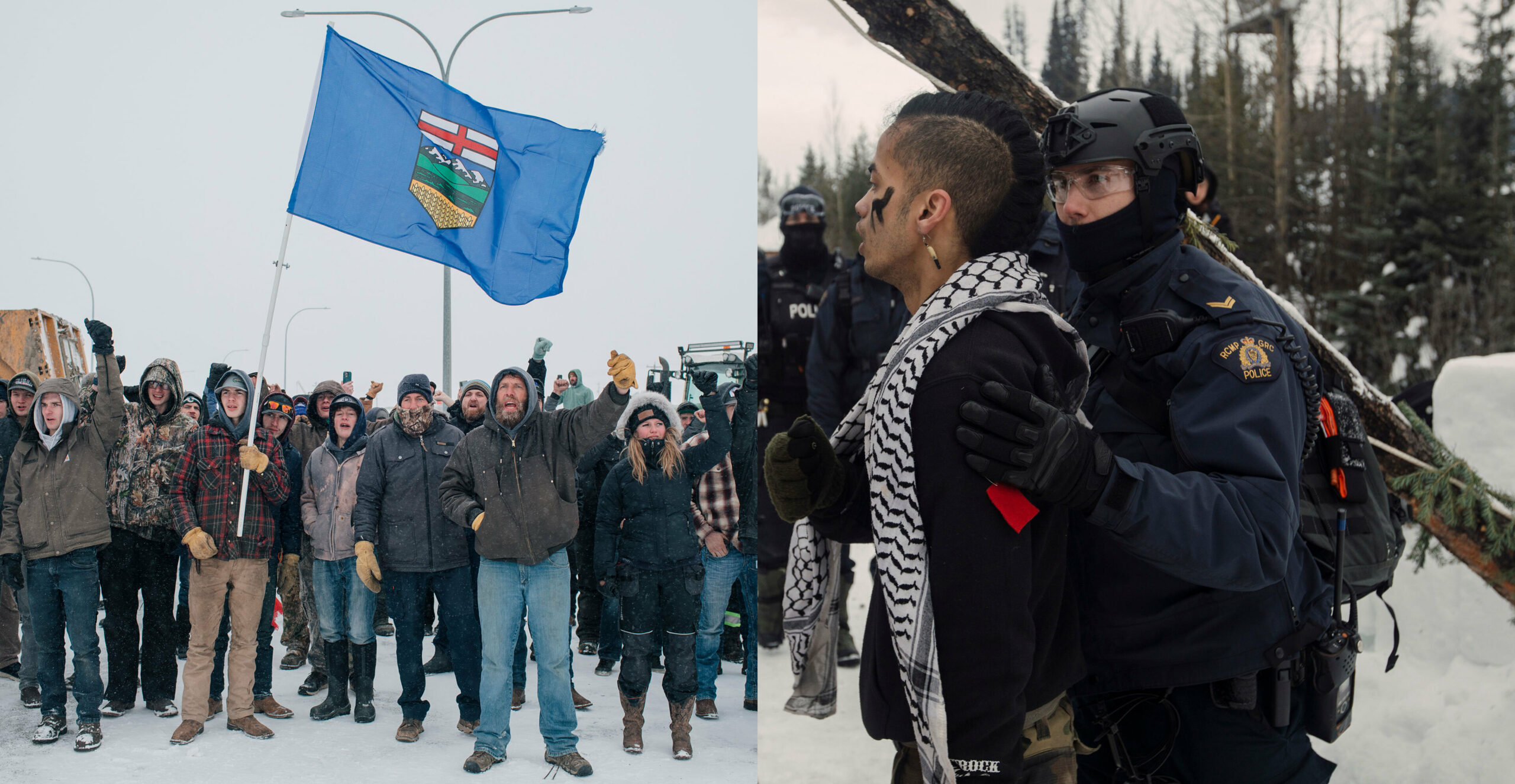
Athabasca Chipewyan Chief Allan Adam, who condemned Bill 1 when it was introduced while protests were still underway in 2020, said the response to protesters at the Coutts border crossing is proof the legislation was intended to prosecute Indigenous people.
“We look at these things, with protesters and pipeline blockers or forestry, you know, environmentalists and stuff like that. And First Nations have been involved with it all,” he told The Narwhal. “And they want to clear it away for industry. Well, this one here, it’s a double-headed coin. It doesn’t only flip one way.”
Adam said there is ample cause to enforce the act at the border, with the province’s most significant crossing to its largest trading partner blocked.
“Who does this law apply to then, Bill 1, if this is not happening right now?” he said, adding he wants to see the law scrapped.
Grand Chief Arthur Noskey of the Treaty 8 First Nations of Alberta said Bill 1 is just one example of laws created that undermine constitutional protections and recognition of inherent Treaty Rights.
He said he raised concerns with the government that the legislation targeted First Nations people, but those concerns were dismissed. The recent blockade, he added, makes it “blatantly obvious” the legislation was meant for First Nations.
“So yeah, we’re kind of just sitting here and observing and going: okay, well, what law do they need to create now? Is it a law on truck drivers?” Noskey asked.
“If Bill 1 does not apply to them, then what now?”
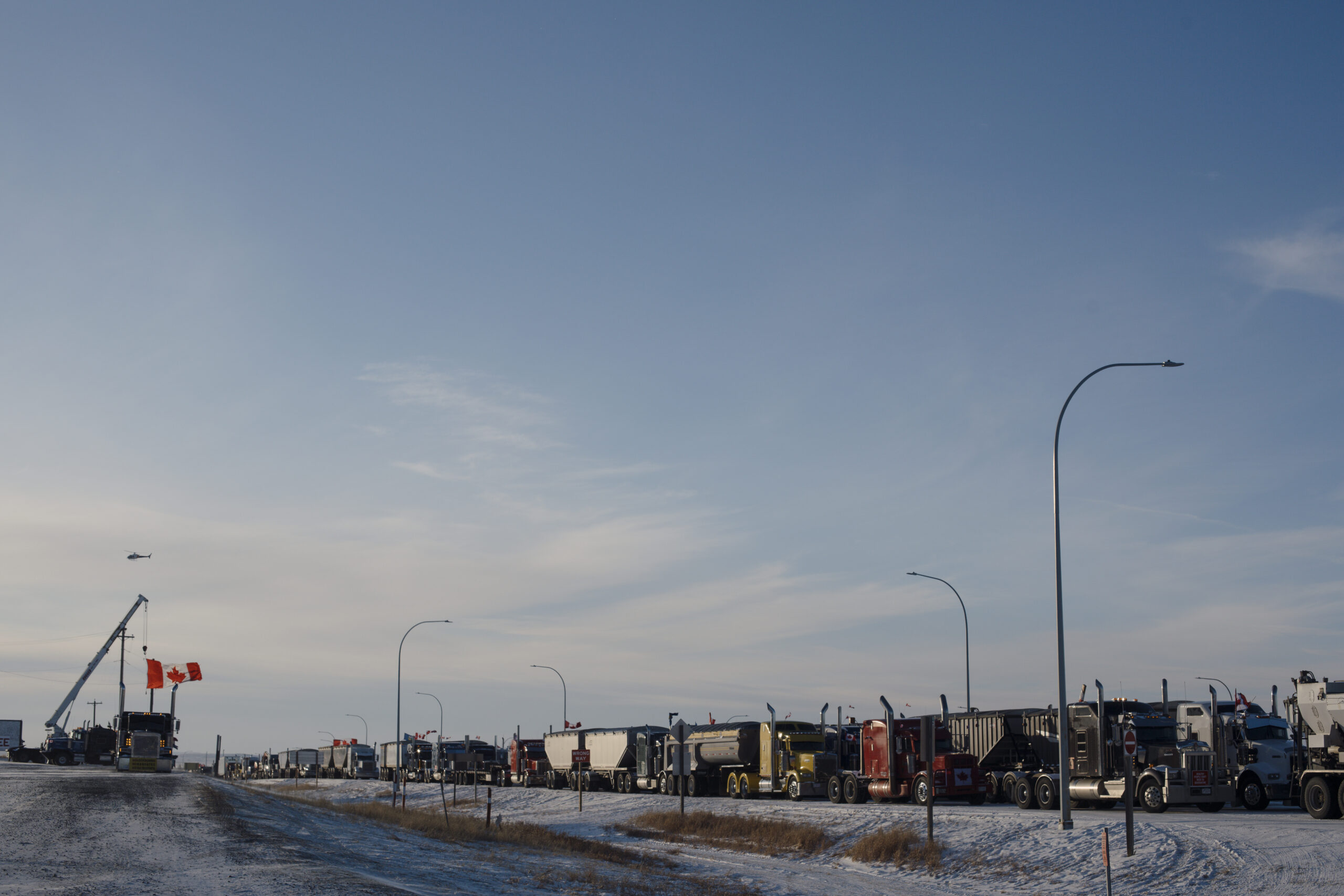
Alex Puddifant, press secretary for the minister of justice and solicitor general, said all questions about enforcement should be directed to the RCMP as the government does not direct the actions of the police “or enforcement of the law.”
That was echoed by Adrienne South, press secretary for the minister of Indigenous relations.
“Alberta’s government is committed to true and meaningful reconciliation. We recognize there is frustration regarding the recent blockades,” she wrote by email.
RCMP spokesperson Cpl. Curtis Peters confirmed to The Narwhal on Thursday that no charges have been laid using the Critical Infrastructure Defence Act at the Coutts border blockade.
The Critical Infrastructure Defence Act is being challenged in two separate cases.
In one, the Alberta Union of Provincial Employees argues the act is so broad and includes enough uncertainty that it could have a chilling effect on legitimate activities and should be quashed. That argument was recently struck by the Alberta Court of Appeals, but the union said on Thursday it is taking leave to have it heard at the Supreme Court of Canada.
Another challenge, filed by the Onion Lake Cree Nation, has not progressed materially and is awaiting a statement of defence from the government.
Jennifer Koshan, a law professor at the University of Calgary who has written about challenges to the Critical Infrastructure Defence Act, said the lack of prosecution at the Coutts border blockade could possibly be used to bolster an argument against the act if it was later brought to bear on Indigenous protesters. But, she added, if she were advising them, she’d point back to those earlier comments from MLAs in the Legislature.
“This is actually kind of an unusual situation in that, even though the law does appear to be neutral on its face, it doesn’t single out any specific groups,” she said.
“The legislative debates do make it pretty clear who the targets of the law were. And so that could certainly be used as evidence in any challenge that was eventually brought.”
Koshan agrees with the First Nations leaders about questioning discriminatory policing of protests.
“I do think it’s fair for people to ask: if we have this law and the government thought this law was important, and was adding something to the tools that police officers have in responding to these sorts of situations, why isn’t the law being used now?” she said.
“And if it was a group of Indigenous protesters who were blockading the building of a pipeline, for example, would we be surprised if the law was enforced in those circumstances? And for me, the answer is no, I would not be surprised, given what the motivation of the law was in the first place.”
Similar concerns about hypocrisy in policing protests have been raised across the country, including in comparison to the recent armed raid on a small group of protesters blockading a road on Wet’suwet’en territory that resulted in multiple arrests.
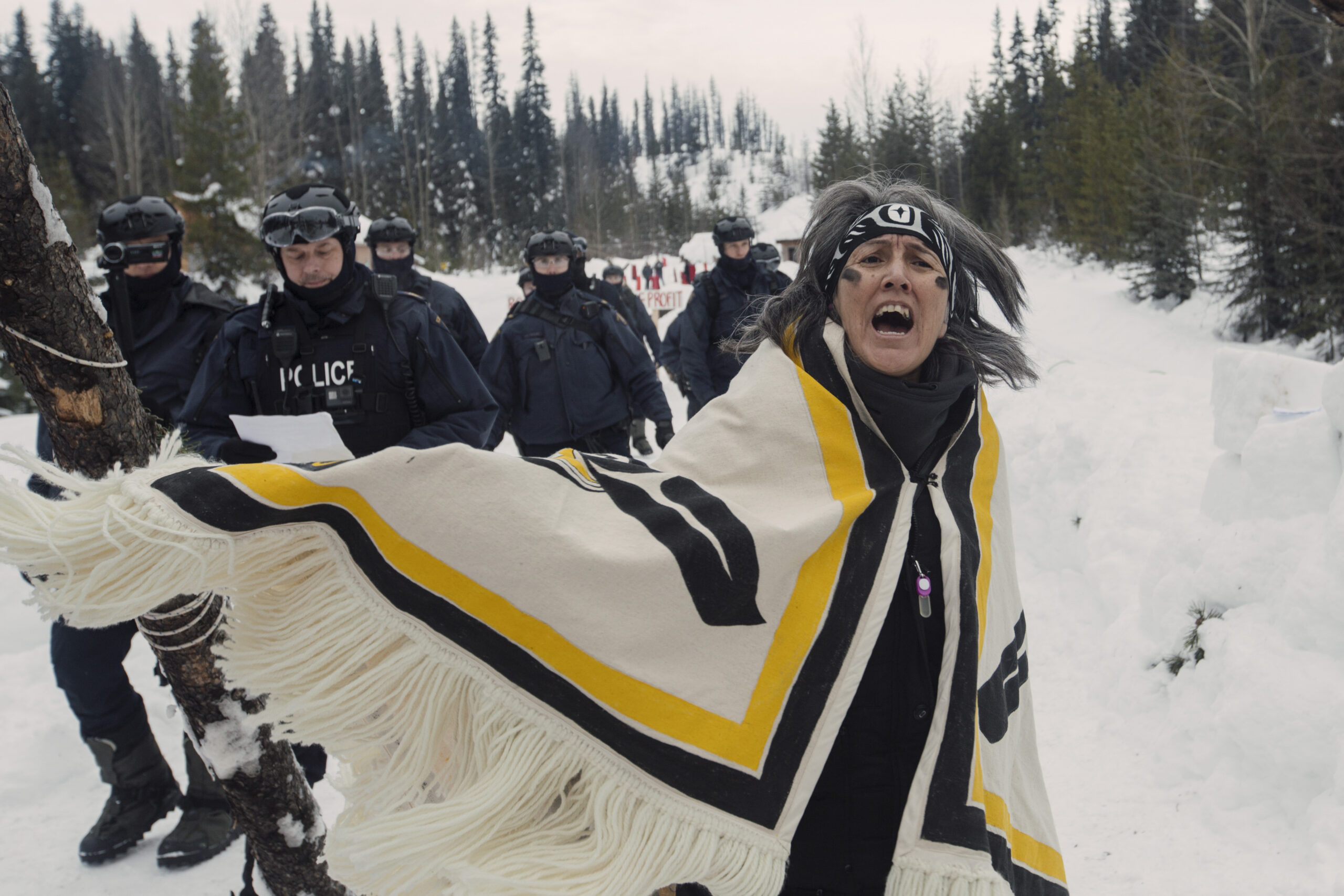
Also in B.C., the recent blockade of a logging road to prevent the removal of old-growth forests at Fairy Creek in Pacheedaht territory resulted in the arrest of over 1,100 people before an agreement was struck with the Pacheedaht, Ditidaht and Huu-ay-aht First Nations to defer old-growth logging for two years in the Fairy Creek watershed and Central Walbran areas on southwest Vancouver Island.
Historically, some First Nations protests have been met with considerable violence, including the Oka Crisis in Quebec, where the military was called in to confront Mohawk resisting plans to expand a golf course on disputed territory, which included burial grounds. One police officer was killed during the standoff.
During the Ipperwash Crisis, in Ontario, protestor Dudley George was killed by police.
In 1974, a caravan of Indigenous protesters crossed Canada, from Vancouver to Ottawa, and was met by RCMP riot police. Several people were injured in the clash.
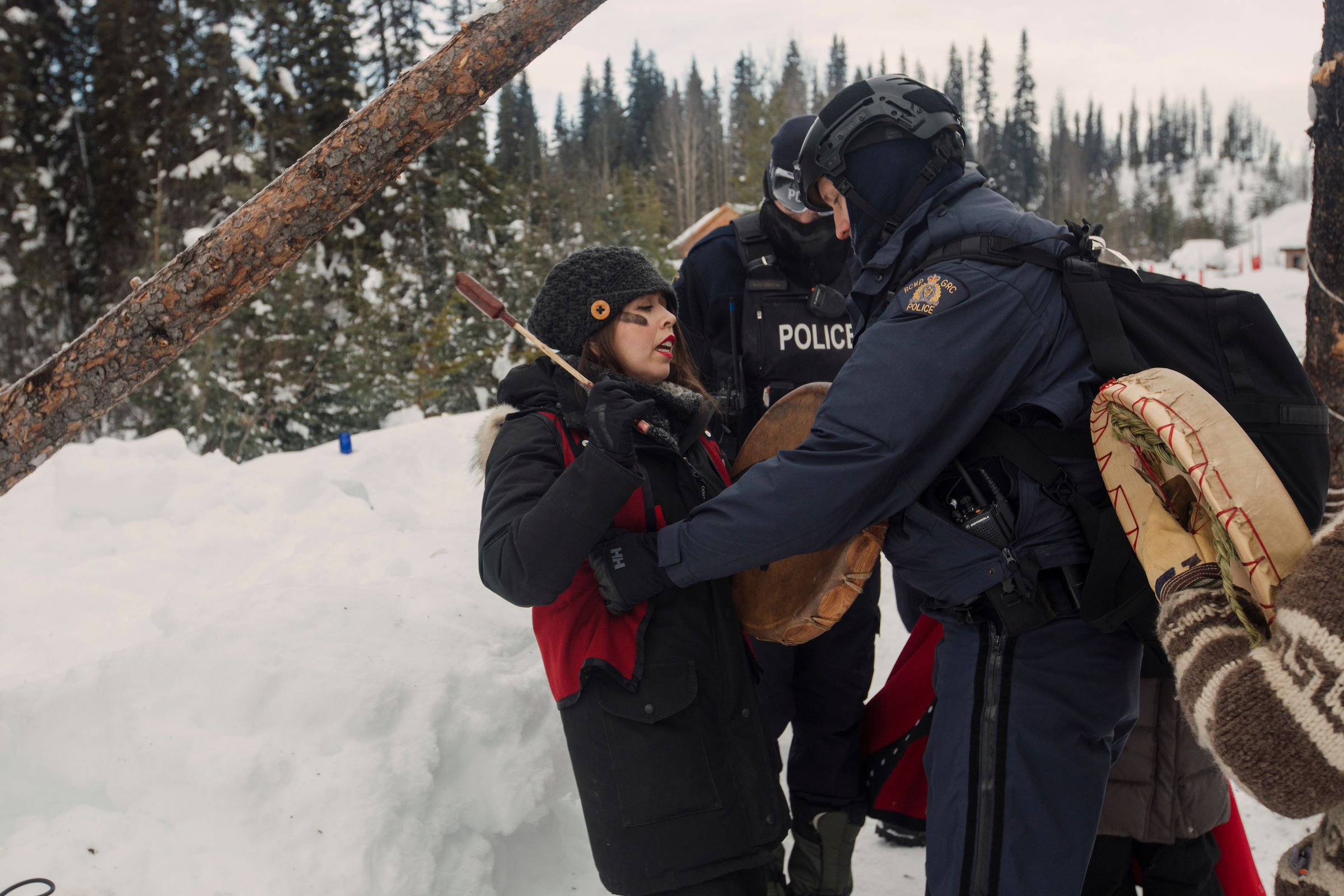
Koshan said Canada has done away with most of its “overtly racist laws,” but that the issue of discriminatory policing has not been resolved.
“Now the issue is that there may be laws that appear to be neutral, but that are enforced adversely against particular groups, racialized groups, Indigenous peoples, and so on,” she said.
“And that’s, in the law, known as adverse effects discrimination.”
That kind of adverse effect, however, is hard to prove. There has yet to be a precedent-setting case argued in front of the Supreme Court, but that could soon change.
“There’s actually a case in front of the Supreme Court of Canada right now, where an
Indigenous woman is arguing that mandatory minimum sentences for drug trafficking have an adverse impact on Indigenous women,” Koshan said.
“So courts are starting to hear these sorts of challenges to supposedly neutral legislation that’s potentially enforced in a disproportionate way. But it’s still an area where the law is developing.”
Updated Feb. 5, 2022, at 3:22 p.m. MT: This article was updated to correct the location of the Oka Crisis of 1990, which was in Quebec, and not in Ontario.
[Top photo: First Nations leaders are asking why protesters at a blockade of a crucial border crossing at Coutts, Alta., are not being arrested under Alberta's Critical Infrastructure Defence Act. The act was created in 2020 by Alberta Premier Jason Kenney in response to Indigenous-led blockades in Alberta. Across Canada, Indigenous land defenders have faced militarized police responses, including on Wet'suwet'en territory. Photos: Amber Bracken]